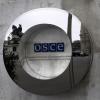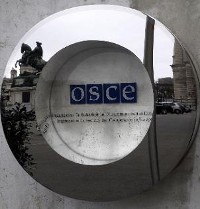
The Organization for Security and Co-operation in Europe (OSCE) is organizing a High-Level Conference to celebrate 30th Anniversary of the Bonn Conference. Dr. Nadejda Komendantova contributes with scientific input to the discussions of the Conference.
 © Vipvideotube | Dreamstime.com
© Vipvideotube | Dreamstime.com
IIASA delegation participates in the OSCE High-Level Conference "Promoting Economic and Environmental Co-operation, Security, and Growth in the OSCE Region: Marking 30 years of the 1990 Bonn Document".
This event is organized by the 2021 OSCE Swedish Chairpersonship and the Permanent Mission of the Federal Republic of Germany to the OSCE, in co-operation with the Office of the Coordinator of OSCE Economic and Environmental Activities (OCEEA).
The conference will focus on highly relevant topical economic, environmental, and social issues. Among them are the role of digital transformation, also in the response to the COVID-19 crisis and opportunities for women’s economic empowerment, the way towards a shared Euro-Asian connectivity, and the implications of Climate Change for economy and security as well as the need for enhanced co-operation and innovation.
Among speakers of the conference are H.E. Helga Maria Schmid, OSCE Secretary General, H.E. Janine Alm Ericson, State Secretary to the Minister for International Development Cooperation of Sweden, H.E. Miguel Berger, State Secretary of the Foreign Office of Germany, H.E. Vuk Žugić, Co-ordinator of OSCE Economic and Environmental Activities, and others.
IIASA Cooperation and Transformative Governance Research Group Leader Dr. Nadejda Komendantova will speak at the session on digital transformation. The session, inter alia, will address challenges faced by governments and businesses in the digital transformation - on how to provide equal regional development and access, also through investments in communication infrastructures and services, impact of digital transformation on the labour market with new work skills being in demand, need for new government regulations and standardization. Dr. Komendantova will provide scientific input to the discussions, speaking about digitalization as contested policy issues with several benefits and risks as well as various perceptions and the need of systems analysis.
Background
The 1990 Bonn Conference is a landmark event in the evolution of the OSCE Economic and Environmental Dimension. In the final Conference Document (the Bonn Document), the CSCE/OSCE participating States (pS) expressed their strong commitment to the principles of a market economy and reiterated their vision to “shape a new order of peace, stability and prosperity in Europe based on the comprehensive and balanced concept set out in the Helsinki Final Act and the subsequent documents of the CSCE documents”.
The pS recognized that “democratic institutions and economic freedom foster economic and social progress”, underlined “sustainable economic growth”, “expanding employment” and the “protection of environment” amongst their common objectives, and emphasized the importance of “co-operation in the field of economics, science and technology and the environment”. Moreover, the Bonn Document includes commitments designed to develop free and competitive markets and economies aimed at promoting environmentally sustainable economic growth and development, as set out in the Chapter on “Co-operation in the Field of Economics, of Science and Technology and of the Environment” of the 1975 Helsinki Final Act.
Based on the outcomes of the Bonn Conference, and with the desire to reinforce the role of the OSCE in economic and environmental matters, pS decided to create in 1992 the Economic Forum (renamed as Economic and Environmental Forum in 2006). Furthermore, in 1994 the position of the Co-ordinator of OSCE Economic and Environmental Activities was established.
30 years after the Bonn Document: new challenges and opportunities
In the last three decades, there have been dramatic changes worldwide that have given rise to new challenges in the OSCE region and magnified existing ones. Globalization and new technologies have unequally impacted economies and societies; new political and economic divisions have emerged and persistent inequalities demand a more strategic and intensive effort for gender equality, including through common action to promote women’s economic empowerment. Climate change has emerged as a major global challenge and has accelerated at an increasing pace, including in the OSCE region, impacting economies, the environment, and societies with possible consequences on security and stability.
At the same time, in the last three decades there has been significant progress in multilateral policy-making. The 2030 Agenda for Sustainable Development and several multilateral agreements have guided the States in their efforts in coping with many of the above challenges worldwide and in the OSCE region. The OSCE pS have benefitted from numerous new opportunities: connectivity, both physical and digital, has created the basis for closer and more interconnected societies and economies; digitalization has offered unprecedented opportunities in almost all spheres of life, economic and business sectors, health, education, the environment, job creation, social welfare, the enjoyment of human rights, democratic engagement, good governance, and the fight against corruption. Significant advancements have been recorded in the recognition of the vital role of women and girls in the global agenda as agents of change. There is a growing awareness that gender-equal societies are more secure with better prospects for equal, sustainable, resilient and prosperous development. It has been widely acknowledged that the achievement of women’s economic empowerment will not only result in women increasingly enjoying their full human rights but also lead to stronger economic development. Increased awareness on the need to protect the environment and to step up action to address climate change has resulted in innovative responses to these challenges by governments and the private sector. Co-operation between pS can provide new avenues for partnerships for green transformation and technology & innovation.
Since 1990, pS have agreed on a number of commitments in many of the economic and environmental areas addressed by the Bonn Document, including the 2003 OSCE Strategy Document on the Economic and Environmental Dimension, and subsequent Ministerial Council decisions.
In light of the above, it is timely now to take stock of the achievements and limitations in reaching the goals of the Bonn Document, 30 years after its adoption by the OSCE pS. Through a holistic approach, this stock-taking should not only give an account of the past accomplishments but more importantly should guide future engagement of the OSCE’s Economic and Environmental Dimension in advancing peace and prosperity in its region in line with the global aspirations laid out by the 2030 Agenda for Sustainable Development and a changed economic and environmental landscape.
Upcoming Events
Potsdam Institute for Climate Impact Research (PIK) & Online
German IIASA Networking Event: "Systems analysis for a sustainable and peaceful future"
Online and Austrian Academy of Sciences (Doktor-Ignaz-Seipel-Platz 2, Vienna)

